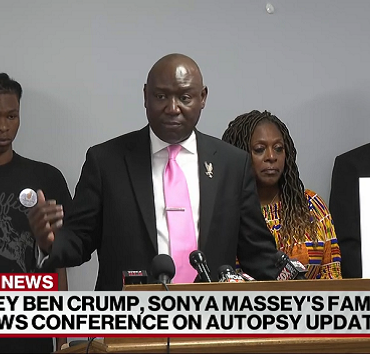-
 play_arrow
play_arrow
WMEX WMEX Boston
-
 play_arrow
play_arrow
Courage To Hope-Episode 82-Michael Courage To Hope-Episode 82-Michael
How Crisis Intervention Training is helping police respond to mental crisis calls
todayMay 29, 2024

Sarah Reingewirtz/MediaNews Group/Los Angeles Daily News/Getty Images
(ANTIOCH, C.A.) — More than three years after watching her brother die in an encounter with police at her family’s California home, Bella Quinto Collins said her brother’s last words still haunt her.
“Please don’t kill me. Please don’t kill me,” Angelo Quinto, a 30-year-old Navy veteran, pleaded as officers allegedly took turns restraining her brother with their knees on the back of his neck, according to Bella Quinto Collins.
Bella said she called the police because Angelo was experiencing a paranoia episode. When the police arrived, she said her brother had calmed down in his mother’s arms.
“When [police] arrived, they had acknowledged that this was a mental health crisis,” Bella Quinto Collins told ABC News of the deadly Dec. 23, 2020, episode that unfolded in Antioch, California.
John Burris, an attorney who represented the Quinto family in a lawsuit filed against the city of Antioch, told ABC News that Angelo Quinto died needlessly.
“[Officers] were aware that [he] was mentally impaired. They were aggressive when they should not have been,” said Burris.
A coroner report concluded that Angelo died from asphyxiation due to being held in a prone position. An autopsy requested by the Contra Costa District Attorney’s Office found the cause of death to be Excited Delirium Syndrome, according to the county’s press release.
Former Antioch Police Chief Tammany Brooks responded to the allegations at a press conference in March 2021.
“At no point did any officer use a knee, or other body parts to gain leverage or apply pressure to Angelo’s head, neck, or throat, which is outside of our policy and training,” said Brooks.
Representatives for the Antioch Police Department declined ABC News’ request for comment.
The Contra Costa District Attorney’s Office said in 2022 there was no evidence of criminal offense by the police officers involved in Angelo’s case based on the autopsy and an analysis of the police encounter with Angelo.
“The method of restraining Angelo Quinto by Antioch Police officers on December 23rd was objectively reasonable under the totality of the circumstances,” the DA’s office said.
Nearly one in four people who have died at the hands of police officers in the United States had a mental health condition, according to the National Alliance on Mental Illness (NAMI). Now, some law enforcement agencies across the country are starting to change how they interact with individuals with mental health issues.
Crisis Intervention Training (CIT) is one model being implemented in many police departments. CIT was created after a man who experienced a mental health crisis was shot in Memphis, Tennessee, in 1988.
There are 2,700 CIT programs in the nation, according to NAMI. During CIT, police officers learn de-escalation techniques through role-play, hear from family members and individuals with mental health conditions and learn about local mental health facilities and resources.
“De-escalation really teaches you to listen to the person, not the problem,” said Ernest Stevens of the Justice Center of the Council of State Governments.
Stevens launched a CIT program in the San Antonio Police Department (SAPD) in 2008. One year later, SAPD successfully helped resident Jeff Ownes, who was experiencing a paranoia episode.
“[Owens] set a fire in [his mom’s] garage, stabbed the family dog with a pair of scissors, threw all the food in the refrigerator away because he thought it was poisoned and began to take apart [his mom’s] car’s engine,” Stevens recalled.
Ownes’ mother, Jeannine Ownes, called police. CIT officers in non-uniform clothing were able to de-escalate the situation and took Jeff Ownes to the hospital to receive the help he needed, Stevens said.
“His life was not threatened and he calmed down,” said Jeannine Ownes. “If [Jeff] was in berserk mode, I would always worry the police would come and they would shoot him.”
In Illinois, Lake County’s Crisis Outreach and Support Team (COaST) program pairs a police officer with a social worker, clinician, or specialist to respond to mental health-related calls.
Lake County officers refer an individual experiencing a mental health crisis to COaST, but if no specialist is available, a CIT-certified officer will address the emergency.
After five years, the program achieved its 5,000th referral in October 2023, a milestone for the city, according to a Lake County press release. One barrier to the COaST program, however, is the lack of counselors or therapists, said James Yanecek, the director of training at the Lake County Sheriff’s Office.
In Denver, Colorado, the Support Team Assisted Response (STAR) program sends a behavioral health professional and a paramedic to help instead of the police.
In three years,STAR program responders went on 7,464 calls, with 49% of the individuals being referred to a mental health service. Police did not issue a single ticket or make an arrest.
CIT programs are not mandatory at police departments and require a 40-hour time commitment, making it difficult for some officers to attend, according to Emily Ribnik of the Criminal Justice Coordinating Center of Excellence at Northeast Ohio Medical University.
Additionally, some rural police agencies with smaller units can’t send officers to CIT programs, said Ribnik.
Mental health advocates believe CIT is a start to create safer spaces for people who are mentally ill. However, successful police responses to mental health crises go beyond CIT, said Hannah Wesolowski, the chief advocacy officer for NAMI.
“The long-term goal is to create alternative responses instead of police,” said Wesolowski.
In New York City, council members introduced a law to staff each police precinct with a licensed social worker in May 2024. The Police Benevolent Association (PBA) responded that mental health should be addressed before a crisis ensued.
“We always welcome more resources to help New Yorkers. However, police officers deal with individuals who need this type of help every single day because they aren’t getting it anywhere else. They should be receiving services before there is a crisis, and certainly before we have to bring them into a precinct because they have harmed someone,” PBA President Patrick Hendry told ABC News.
Yaneck of the Lake County Sheriff’s Office argued that police can play an important role in responding to a mental health crisis.
“It allows us to have that contact with folks, and for them to understand that we are not there to arrest them or give them a ticket,” said Yaneck. “It reduces the anxiety for them.”
After the death of Angelo, the Quinto family pushed for the Antioch Police Department to use body cameras and other reforms. Antioch police also initiated Antioch CARE, a program to address mental health-related emergencies.
“This is an example of turning a tragic event into a very positive effort on the part of [the Quinto] family,” said Burris.
The Quinto family ultimately settled with the city for $7.5 million over Angelo’s death.
Copyright © 2024, ABC Audio. All rights reserved.
Similar posts
CONTACTS
- https://wmexboston.com
- 781-834-WMEX(9639)
- studio@wmexboston.com
- 130 Enterprise Dr, Marshfield, MA 02171
ABOUT
WMEX Boston can be heard at 1510 AM, and 101.1 FM. Playing the greatest hits from 50s, 60s, 70s, 80s, and more!
MENU
SPONSORS
Copyright 2024 WMEX Boston - Design by Pro Radio Solutions




